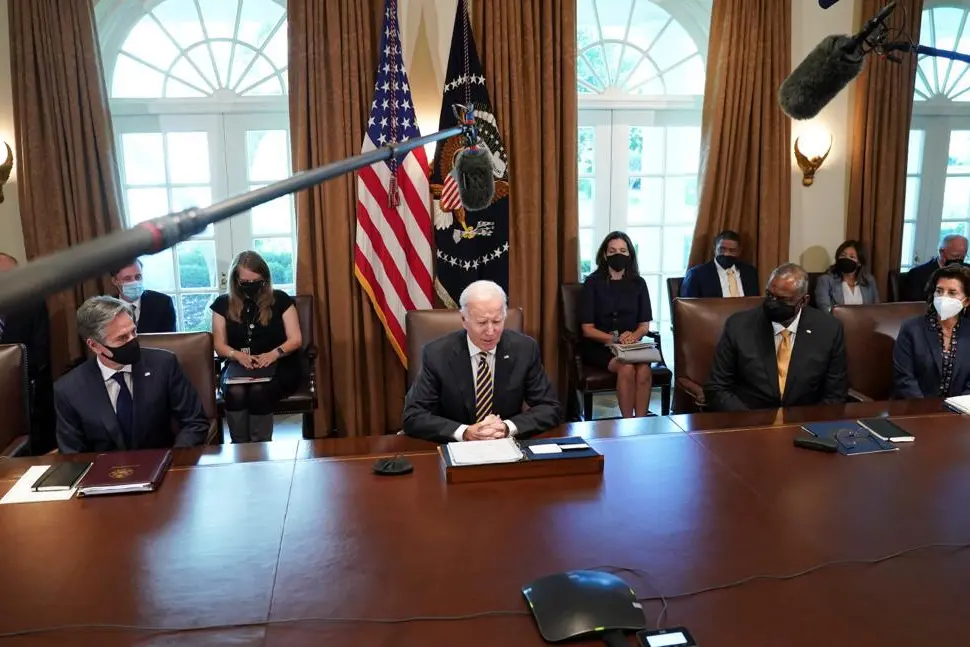PHOTO
The American composer Thomas Newman summed up the present political situation of the Biden administration and the Democrats well when he said, “There’s nothing like desperation to sharpen your sense of focus.” With their backs to the wall — following their shocking loss in the Virginia governor’s race — and with their ambitious domestic agenda stalled, the White House and the party stared into the political abyss and then tried to jump over it.
This political calculation, which we predicted here just weeks ago, came to pass, as the White House finally passed their mammoth, bipartisan infrastructure bill. After being held hostage for weeks by restive progressives in the House of Representatives, in the wake of the Virginia vote the political logjam immediately cleared. In the end, the House passed the bill relatively comfortably, 228-206. In return for passing the infrastructure bill — beloved by moderates such as Senators Joe Manchin of West Virginia and Kyrsten Sinema of Arizona — the progressives received the moderate promise that there would be a vote on the larger $1.75 trillion social care progressive wishlist bill by Nov. 15.
As ever, this being the US Congress, there was a codicil to the deal. Moderates demanded that the nonpartisan Congressional Budget Office score the larger bill, seeing to it that its provisions were entirely paid for. If this proved to be the case, moderates would acquiesce and vote for the progressive’s dream bill. If not, another round of internal Democratic Party fighting was due to break out. But the half-measure was enough to satisfy progressives, who are just as terrified as their moderate counterparts as to what the Virginia vote portends.
Frankly, its meaning is nothing short of a four-alarm fire for the now majority party. The 2022 midterm elections already had the Democratic Party running into a headwind. Traditionally, the first midterm after a new president is sworn in results in a shellacking for his party, as the experiences of Ronald Reagan in 1982, Bill Clinton in 1994 and Barack Obama in 2010 all attest to.
This general problem was linked to Biden’s very specific precarious political situation. While the Democrats hold the majority in both chambers of Congress, it is by the thinnest margins in recent political history. In the House, the Democrats have what amounts to a three-seat majority. In the 50-50 Senate, Vice President Kamala Harris is the tie-breaking vote in the Democrats favor. Structurally, these minuscule margins have always been at odds with the immensity of the ambitious Democratic Party domestic agenda. It leaves every Democratic senator, particularly wary moderates like Manchin and Sinema, with an effective veto over the party’s general prospects.
Worse even than all these troubling signs is that this is a majority that is not likely to be around for much longer. Even before the catastrophic Virginia vote, most of the country has Republican-dominated state legislatures, the very people who every 10 years with the census redraw congressional boundaries, always to the benefit of the majority party. Given this advantage, Democrats — with their tiny House majority — started out the 2022 cycle effectively behind, as these redrawn districts were likely to favor Republicans by between 10-20 extra House seats. The fragile Democratic majority, for all of these fundamental reasons, was always likely to come to an end just a year from now.
It is in this darkening (for the Democrats) political context that the electric Virginia political result must be seen. The Democratic contender, Terry McAuliffe, was a former Virginia governor, master Clinton family fundraiser, and a bastion of the Democratic Party establishment. At separate times, Barack Obama, Joe Biden, and Kamala Harris all came to personally campaign for him.
That was precisely the problem. The election was highly nationalized and with the president’s approval rating sinking to the barely palatable dregs of the lower 40 percent range, this fairly solidly Democratic state reacted with disgust to how little the Biden White House has been able to accomplish.
A state with parents with school-aged children — they favored the Republican Glen Youngkin by 17 points over McAuliffe — overwhelmingly voted to give the Democrats a vote of no confidence. Sick of 18 months of lockdown, home schooling, the indirect teaching of the highly divisive doctrine of Critical Race Theory, and disgusted with McAuliffe fatally saying he didn’t think parents had any business telling their children’s teachers what to do, Virginia’s moderate Democratic and independent parents — who had comfortably handed Biden a 10-point win over Donald Trump just a year ago — savagely turned on the Democratic establishment. Suddenly, the very difficult 2022 vote looked instead like a political tsunami heading the Democrat’s way.
Faced with the “do nothing” attack label in 2022, the Democrats acted quickly to try to limit the damage. While a loss is still likely in the midterms next year, avoiding political calamity became the overriding priority. Ironically, the dismal Virginia result became the midwife for the passage of the infrastructure bill, as at least the party has a major legislative accomplishment to show for itself. Desperation forces action. For better or worse, it was enough to get the Democrats moving.
- John C. Hulsman is the president and managing partner of John C. Hulsman Enterprises, a prominent global political risk consulting firm. He is also a senior columnist for City AM, the newspaper of the City of London. He can be contacted via johnhulsman.substack.com.
Copyright: Arab News © 2021 All rights reserved. Provided by SyndiGate Media Inc. (Syndigate.info).





















